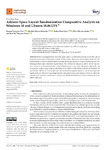Address Space Layout Randomization Comparative Analysis on Windows 10 and Ubuntu 18.04 LTS

Use este enlace para citar
http://hdl.handle.net/2183/29307
A non ser que se indique outra cousa, a licenza do ítem descríbese como Atribución 4.0 Internacional
Coleccións
Metadatos
Mostrar o rexistro completo do ítemTítulo
Address Space Layout Randomization Comparative Analysis on Windows 10 and Ubuntu 18.04 LTSAutor(es)
Data
2021Cita bibliográfica
Díaz, R.V.; Rivera-Dourado, M.; Pérez-Jove, R.; Avendaño, P.V.; Vázquez-Naya, J.M. Address Space Layout Randomization Comparative Analysis on Windows 10 and Ubuntu 18.04 LTS. Eng. Proc. 2021, 7, 26. https://doi.org/10.3390/engproc2021007026
Resumo
[Abstract] Memory management is one of the main tasks of an Operating System, where the data of each process running in the system is kept. In this context, there exist several types of attacks that exploit memory-related vulnerabilities, forcing Operating Systems to feature memory protection techniques that make difficult to exploit them. One of these techniques is ASLR, whose function is to introduce randomness into the virtual address space of a process. The goal of this work was to measure, analyze and compare the behavior of ASLR on the 64-bit versions of Windows 10 and Ubuntu 18.04 LTS. The results have shown that the implementation of ASLR has improved significantly on these two Operating Systems compared to previous versions. However, there are aspects, such as partial correlations or a frequency distribution that is not always uniform, so it can still be improved.
Palabras chave
ASLR
Memory
Comparative analysis
Windows
Ubuntu
Memory
Comparative analysis
Windows
Ubuntu
Descrición
Presented at the 4th XoveTIC Conference, A Coruña, Spain, 7–8 October 2021
Versión do editor
Dereitos
Atribución 4.0 Internacional






